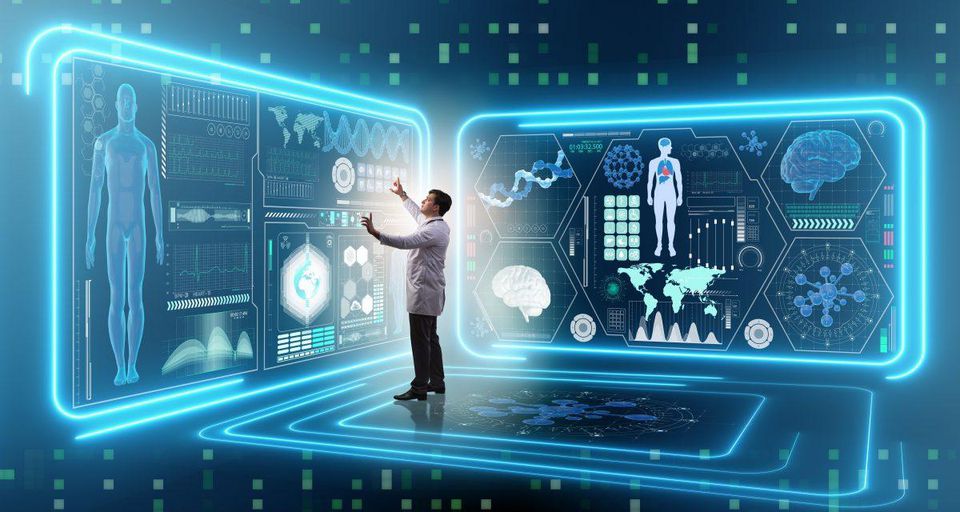
Recent Upgradations in Medical AI
Artificial intelligence research within medicine is expanding rapidly. Healthcare AI projects attracted more investment in 2016 than AI projects within any other sector of the global economy. The last couple of years have seen ideas for applied AI in healthcare emerges and deployed as well. The research has moved from paper to the patient.
Traditionally, statistical methods have approached this task by characterizing patterns within data as mathematical equations, While the former is directed towards gaining knowledge about what happens at the cellular level, the latter deals with how to make technology more accessible with user-friendly interfaces both for doctors and patients. There are two main areas which have seen a sporadic growth in research — Genomics and Digital Medicine.
In this article we will have a glance of current trends in medical AI and the future possibilities for general practice.
AI Excels in the field of Cancer:
In Medical cancer, Scientists and technologists alike are seeing hope though – not through increased funding but technological advancement in the form of Artificial Intelligence. An early-stage cancer diagnosis is currently the closest to cure.
As per the researchers machine learning algorithms for computer vision have become really good at identifying anomalies. MIT’s Computer Science and Artificial Intelligence Laboratory (CSAIL) and Massachusetts General Hospital (MGH) have created a new deep-learning model that can predict from a mammogram, within 5 years in advance. If the patient is likely to develop breast cancer, then a 5-year window has the potential to save many lives.
While no-one on the panel came out and said that big pharma is slowing the progression of AI to cure cancer, hence an upcoming solution has been taken by the researches and are also eager to apply the models to other diseases and ailments, and especially those with less effective risk models, like pancreatic cancer.
AI as Medical advisor:
Amazon’s Alexa will now give answers based on information from the health service website, which has been verified by health professionals. It sets to answer people’s health queries by searching the official NHS website – and sharing the most relevant advice.
NHS to provide the users with medical advice, but the sources of the answers varied depending on the skills downloaded to the voice assistant or certain information that Alexa sources directly from third parties such as NHS and provides without the need for activating a skill.
However the enhancement of Alexa will take time, as the users are not being comfortable with discussing their ailments with a non-human entity.
AI Excels in the field of Kidney disease:
one of the biggest challenges hospitals face is predicting when frail patients will decline into a life-threatening spiral. According survey chronic kidney diseases (ones lasting more than three months) affect 10% of men and nearly 12% of women around the world. Up to 10.5 million people need dialysis. In addition, more than 13 million people suffer from acute kidney injury.
One of the most common causes of death in hospitals is acute kidney injury, or AKI, the sudden loss of function in this vital blood-cleaning organ.
DeepMind in collaboration with experts from the US Department of Veterans Affairs (VA), has developed a technology, they designed an artificial-intelligence algorithm to identify factors that suggest someone is at risk of AKI and to predict it 48 hours before it happens.
We see huge potential that [this algorithm] could provide a window in the future for earlier preventative treatment and avoid the need for more invasive procedures like kidney dialysis.
AI train Neurosurgeons Based VR
Research from the Neurosurgical Simulation and Artificial Intelligence Learning, Montreal Neurological Institute and McGill University Health Centre, in which researches shows that machine learning algorithms can accurately assess the capabilities of neurosurgeons during virtual surgery and could guide virtual reality training platforms for neurosurgeons.
Hence we prove that we can design systems that deliver on-demand surgical assessments at the convenience of the learner and with less input from instructors. AI mentoring systems can be developed that focus on improving patient safety by guiding trainees through complex surgical procedures.
The level of expertise of the surgeons can then be determined accurately by looking at how well they score with machine learning models.
NHS buildup AI lab
National Health Service in England is launching a national artificial intelligence laboratory to enhance the care of patients and facilitate research. It has enhanced its features in identifying lung cancer, skin cancer, automating admin tasks, giving medical professionals more time with patients. and more than 50 eye conditions from scans. In addition, the British government will spend £250 million to boost the role of AI within the health industry.
The team believes that with modern AI will improve medicine, to save lives, to improve the way treatments in simple it’s a mixture of human and artificial intelligence can be deployed across discipline boundaries to generate greater collective intelligence.
Conclusion:
AI proactively suggests consultations when it determines that the patient’s risk of developing a particular diabetic complication warrants intervention. AI could automatically prepare the most important risks and actions given by the patient’s clinical record.



